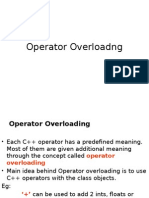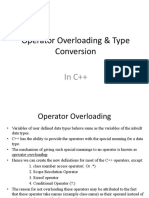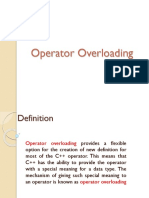0% found this document useful (0 votes)
36 views3 pagesOperator Overloading in C
Operator overloading in C++ allows users to redefine the meaning of existing operators for user-defined data types, enabling operations similar to those on built-in types. Certain operators, such as the scope operator and sizeof, cannot be overloaded. The syntax and rules for operator overloading specify how to implement these functions and the conditions under which they can be used.
Uploaded by
Mohit SinghCopyright
© © All Rights Reserved
We take content rights seriously. If you suspect this is your content, claim it here.
Available Formats
Download as PPTX, PDF, TXT or read online on Scribd
0% found this document useful (0 votes)
36 views3 pagesOperator Overloading in C
Operator overloading in C++ allows users to redefine the meaning of existing operators for user-defined data types, enabling operations similar to those on built-in types. Certain operators, such as the scope operator and sizeof, cannot be overloaded. The syntax and rules for operator overloading specify how to implement these functions and the conditions under which they can be used.
Uploaded by
Mohit SinghCopyright
© © All Rights Reserved
We take content rights seriously. If you suspect this is your content, claim it here.
Available Formats
Download as PPTX, PDF, TXT or read online on Scribd
/ 3


























































